After Game 1 of the Stanley Cup playoff series between the Anaheim Ducks and San Jose Sharks, I wrote, “The San Jose Sharks didn’t so much outplay the Anaheim Ducks in Game 1 of their opening-round playoff series, they outpoised them.”
After Game 2, I wrote Anaheim needed to make changes to stay in the series, “It requires more emphasis on the playing hockey part and less on trying to intimidate the Sharks. The Sharks have refused to play down to the Ducks’ level.”
After Game 3, it was, “…the Sharks can close out the series against a team more interested in extracting a pound of flesh instead of an ounce of dignity.”
As a college classmate of mine once dryly remarked, “I need to stop being redundant and repeating myself.”
For the Ducks, the storyline was repetitious because the Ducks made the same unforced mistakes over and over.
Telling Moment in the Ducks-Sharks Series
There were many telling moments in the series. A series the Ducks were swept out in four games and a series they richly deserved to lose.
The series was encapsulated for me by a sequence in the third period of Game 2, with the Ducks trailing by one goal and under five minutes left. Anaheim’s Corey Perry ran Melker Karlsson. It was a dangerous hit, one which will get a penalty every time. Perry’s buffoonish move landed him in the penalty box, greatly reducing the chance for the Ducks to tie the game. Had a major penalty been assessed (and majors are often assessed for this sort of hit), it would have effectively ended any hope for a Ducks win.
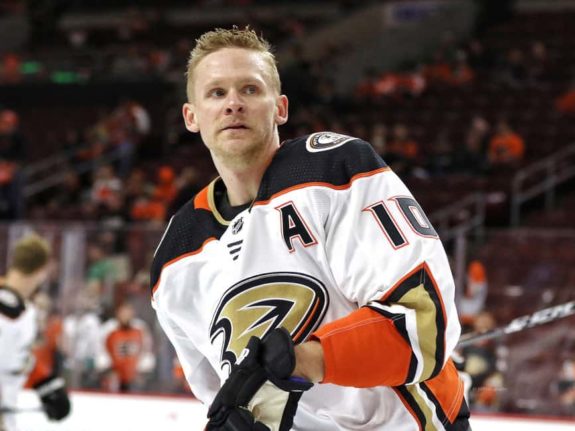
Alas, Perry’s hit was bad enough, but he also complained vociferously after the call. Perry has been in the NHL for thirteen seasons and wears an ‘A’ on his sweater, presumably because he’s a team leader. Remarkably, he thought the hit deserved a pass from the officials.
Perry’s misplaced anger serves as a perfect metaphor for a team which isn’t willing to be accountable. The blame lies in the mirror, but no one in Anaheim seems to own one.
The Ducks’ Captain Taps Out
Perry’s foolish play was hardly the only instance of Ducks’ leadership coming up small. Ryan Getzlaf is the player wearing the ‘C’ for Anaheim, signifying he is the team’s captain. In Game 3, about eight minutes into the third period, Getzlaf committed a pair of minor penalties. In the process, he tried to get into a fight with Marcus Sorensen, the Sharks smallest player. Getzlaf is six inches taller and 50 pounds heavier. But he isn’t much of a tough guy if he’s looking to tangle with the other team’s smallest player.
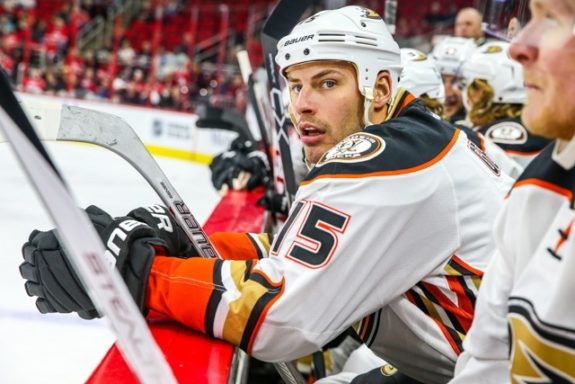
It gets worse. While in the penalty box, Getzlaf waved the white towel, a universal symbol of surrender. After getting out of the box, he returned to the Ducks bench. On his next shift, with just under ten minutes to go in the game, Getzlaf earned a 10-minute misconduct penalty, ending his night.
Yes, the team captain did the hockey equivalent of tapping out. I should repeat this for emphasis. The Ducks team captain tapped out of a Stanley Cup playoff game.
Or, as Eric Stephens wrote, “Arguably the worst loss in franchise history – playoff or regular season – it (Game 3) was marked by an embarrassing third period when an argumentative Getzlaf was given an early exit along with needless frustration penalties taken by Perry and Kesler.
Guilty Parties?
In crime thrillers, the audience is left guessing who the guilty party is. In rare cases, everyone is responsible; all the suspects are guilty of the crime. This is the case with the Anaheim Ducks, all the suspect parties are the problem. It’s not one person, or two or even three. This Ducks team rots in too many places.
A Talented Ducks Roster
Looking at the rosters, the Ducks-Sharks series had every reason to be highly competitive. One can reasonably argue the Ducks had the more talented roster. Looking at their top nine forwards, top two defensemen and goalie, it’d be hard to argue the Sharks were more talented at the top of the roster.
Getzlaf was over a point per game player, the only one on either team. The Ducks had four defensemen and eight players in total who were plus-12 or better this season playing in the series. The Sharks had none. Getzlaf was plus-20 on the season, Josh Manson was plus-34.
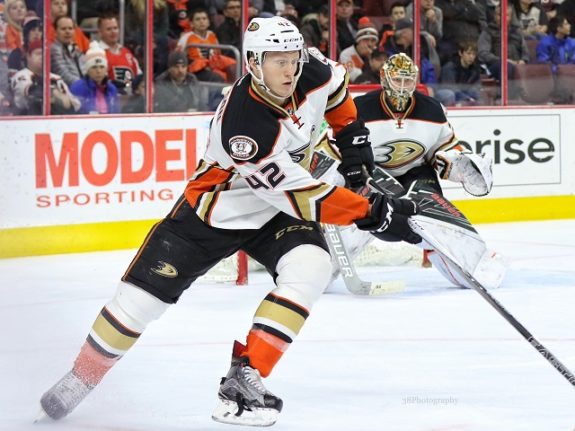
Five different Ducks forwards had at least one 30-goal season on their resume, another five had at least one 20-goal season. John Gibson was a deserving contender for the Vezina Trophy as the league’s best goaltender.
A rash of early-season injuries forced the Ducks to play catch-up over an extended period; the Ducks did just that. It was a team vastly improved from early in the season.
On Dec. 20, shortly after Getzlaf returned from injury, the Ducks were 14-13-8. They went 30-12-5 the rest of the way –a pace of 113 points over 82 games. The Nashville Predators posted the league’s best mark with 117 points, Winnipeg was second with 114. Saying Anaheim was playing as well as anyone wasn’t hyperbole, just a straightforward fact.
The Ducks rolled into the playoffs with a formidable roster. They had more playoff experience than any other team entering the playoffs. They were also hot, going 10-1-1 in their last dozen games.
In short, this relatively healthy Ducks team had all the earmarks of an elite team. This was a team set up for success. Or so it seemed.
The Ducks were not the sum of their parts against San Jose. They were so much less. Embarrassingly less.
The Ducks’ Dirty Play
Game 3, like the others before it, featured the Ducks performing the NHL equivalent of a hissy fit, with their players routinely slashing and crosschecking Sharks players. It was dirty. Consistently dirty. Officials called penalties often enough (I’ve argued elsewhere frequent fines are an appropriate league response). Late in Game 3, for example, Derek Grant managed to take multiple cheap shots at multiple Sharks players while on his way to the bench at the end of a shift. Just following the garbage example set and accepted by leadership.
The Ducks sent a clear message, albeit an embarrassing one: ‘I’d rather hurt you than beat you.’ This is a self-destructive mindset.
Cutting Critiques
Perhaps the most cutting critique came somewhat innocently and from one who recently played in the Ducks organization. The Sharks’ Eric Fehr spent almost the entire season playing for the San Diego Gulls, the Ducks AHL affiliate. In his postgame interview after Game 3, Fehr hit the nail on the head. When asked about the Ducks frequent slashings, Fehr replied: “You’re prepared for it, but it would be nice just to keep it to a hockey game out there.” Amazingly, another player suggested the Ducks were so sidetracked by their own antics, they stopped playing real hockey.
Want the word of someone else? Try this from CBS’ Pete Blackburn,“Perry had an especially rough series … and took dumb penalties for crap like this.” Later in his article, Blackburn titled a section describing the Ducks play: “Dumb hockey and bad penalties.”
Sharks analyst Jamie Baker, not known for hyperbole, also weighed in (at the four-minute mark of the interview), “He (Getzlaf) abandoned his team last night.” And while it was less pointed, he also said the Ducks forwards were playing “hope hockey.” (7:30 mark)
Over at the Anaheim Calling website, Justin Ritzel wrote: “it’s the leadership core doing all the damage in front of a head coach refusing to hold his players accountable.”
Over on the Anaheim Calling podcast, there was this exchange (35:40 mark) between Felix Sicard and Jake Rudolph. Sicard said, “this wasn’t a pretty sweep, I think you can say that.” And the response from Rudolph was, “This wasn’t one you can take some dignity out of.”
Sharks-Ducks Game 4 Provides Contrast
Game 4, the series finale, proved how absurd the Ducks were in the first three games. In Game 4, the Ducks showed up and played like men. It was a tough, physical game. Anaheim inflicted plenty of hard hits on the Sharks, but there was a notable lessening of the dirty play so prevalent in the first three games. The game was highly competitive and played at a high level by both teams. The Sharks played hard and won by the slimmest of margins. Brilliant goaltending and some good puck luck helped San Jose. It was a great battle. If the Ducks played like this every game, they’d be the serious Cup contender that so many metrics indicated they’d be.
The contrast offered between Game 4 and the prior three games was staggering. It highlighted how badly the Ducks sabotaged themselves.
Anaheim’s Internal Awareness?
The Ducks are hardly their own worst critics. After Game 4, Corey Perry commented, “This definitely was our best game but it still wasn’t enough and it’s tough because you play this way the first couple games and you never know what can happen. That’s the frustrating part.” Except, as we’ve already seen, Perry was a big part of the problem in those “first couple games.” He had control over his actions and he’s a team leader. Playing one good game (which he did in Game 4) in a best of seven series doesn’t cut it.
Head coach Randy Carlyle wasn’t much better. The Ducks got called for bunches more penalties in the first three games because they committed bunches more penalties. But Carlyle seemed to expect the same number of penalties on both sides, even if the Ducks were committing two or three times as many. According to Carlyle, “if the same infractions are happening against us, then we deem that they should be called. That’s all. That’s the way I view the officiating.” Thing is, it’s exactly what was occurring. The Ducks were being treated fairly by the officials, but Carlyle refused to see it.
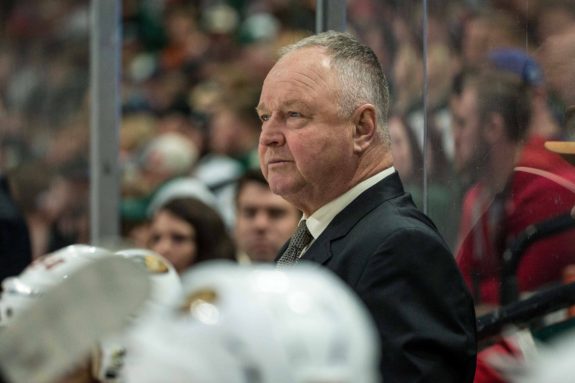
The Sharks showed up for an NHL playoff series. The other team was more interested in inflicting damage. The Ducks were the Charlestown Chiefs – except this wasn’t a movie and it wasn’t funny.
Endorsed By the Ducks’ Management
No team sabotages itself without the implicit consent from the guys in suits. The ownership, executive management and coaches had to accept this approach, otherwise the players wouldn’t do it. Because of this, the Ducks entire leadership needs to be overhauled. The guys wearing the uniforms are part of the problem, but it reaches far higher in the organization.
Major Surgery Required for the Ducks
You can’t fire ownership, but you can fire the executives and the coaches. And you can trade the players. Even though they have no-movement clauses, the Ducks need to get rid of Kesler, Perry and Getzlaf. They bring out the worst in each other and have become a cancer to themselves, to the team and to the organization. They need to be in three different places and playing for three different coaches. Teams like the Philadelphia Flyers, Florida Panthers, Colorado Avalanche and Chicago Blackhawks can use these players (but no more than one per team). The right trade will see them with strong coaches who are capable of integrating their considerable talent while not letting these players self-destruct or bring harm to the rest of the team.

While one might not get a huge return for Kesler or Perry (due to contract size and length), Getzlaf would bring in a massive haul. His contract is a bargain for a player at his level and there are few players at his level.
I considered less drastic measures such as stripping the letters from Kesler, Perry and Getzlaf or firing the coach. But it isn’t adequate. These moves would send a message, but this team doesn’t need to be sent a message. It’s way past this point, what’s needed is a fundamental change in culture.
Some might think I’m throwing out the baby and the bathwater, but the metaphor does not apply. If you’re looking for a metaphor, try this. When a patient has a body part surgically removed because it suffers from gangrene, the surgeon isn’t going leave part of the gangrene in place when it all of the problem must be removed. The Ducks don’t need an incomplete surgery where elements of the problem might be left to rot in place.
Ducks’ Youth Deserves Better
The Ducks young talent deserves a leadership group better than what they’ve got. Hampus Lindholm, Ondrej Kase, Brandon Montour, Rickard Rakell and goalie John Gibson are all under 25, and all really good players. Manson and Cam Fowler (who missed the series) are just 26.
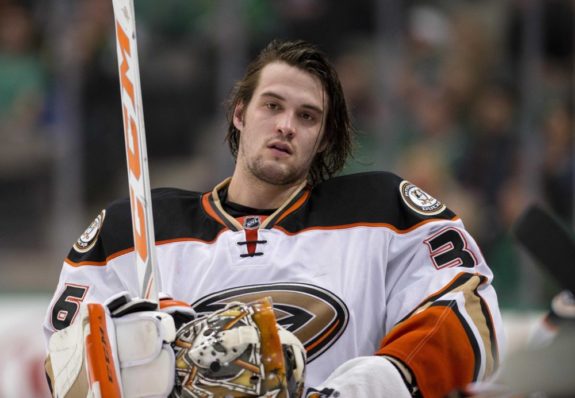
Nick Ritchie is 22 and still developing. Veterans Andrew Cogliano and Jakob Silfverberg are solid players who can play major roles on second and third lines – roles which are more critical than ever to NHL success.
These ten players can form a capable backbone for a very competitive team. Getting significant assets in return for the team’s “leaders” will get the Ducks back to contention quickly. This is not a team which needs to take a long wander in the hockey wilderness. Vegas has already shown a team can win with plenty of depth and a modicum of top-end talent. The Ducks have the core talent to quickly return to contender status. And trading Perry, Getzlaf and Kesler for younger talent means the Ducks can be very competitive for another very lengthy cycle.
Bad For Everyone, Including the NHL
The hockey played by the Ducks in the first three games against San Jose isn’t simply bad for the Ducks, its bad for the NHL. Its bad for hockey fans and especially Ducks fans. It’s downright disrespectful to the team’s paying customers. And it’s an insult to the rest of the NHL teams who battled for a playoff spot.
I’m happy to see high quality, hard, heavy hockey and the Ducks are capable of playing this. I saw it in Game 4. The Ducks deprived everyone of a series where every game could have looked a lot like Game 4. What an awesome series that would have been. At their best, the Ducks play what many describe as a man’s game. But when things go badly (and even sometimes when they don’t), men don’t behave like adolescents.
It will be popular to suggest the Ducks need to get younger and faster. But here’s a hard truth. There is nothing inherently wrong with the Ducks hard, heavy game (though a bit younger makes sense). The game they played against the Sharks in Game 4 is going to win most nights against any of the league’s best teams. It was effective and impressive. Furthermore, speed is a misunderstood asset. Playing fast has little to do with raw speed and everything to do with being able to anticipate the play. Anticipation isn’t a function of size or raw speed. As Igor Larionov wrote,”It’s not how fast you skate, it’s how fast you think.”

Another hard truth. Ducks general manager Bob Murray has delivered an elite roster with no chemistry. The Ducks had a bad break with the illness which felled Patrick Eaves (another player with a 30-goal season on his resume). Cam Fowler also missed the series (to be fair, Joe Thornton missed the series for San Jose). But a roster has to mesh and this is also part of a general manager’s responsibility.
The Anaheim Ducks’ Core Challenge
The Ducks’ problem isn’t speed or youth or talent, it’s the mindset.
Instead of showing up for a big playoff series playing playoff hockey, the Ducks decided to play a garbage style game.
I’ll recap some of the comments, not from me, but from others:
“crap like this”
“be nice just to keep it to a hockey game”
“Dumb hockey and bad penalties”
“abandoned his team”
“hope hockey”
“a head coach refusing to hold his players accountable”
“This wasn’t a pretty sweep … This wasn’t one you can take some dignity out of”
Here’s the important common link between these comments. None relate to talent or skill deficiencies, none are about speed or a heavy game or anything else of the sort. They’re all about the mental portion of the game.
The Ducks earned this commentary and, as a result, they need to make enormous changes. I rarely think it’s a good idea for a team to “blow it up,” especially one which has delivered mostly good results. But in this case, it needs blowing up, at least at the top.
The stench of what happened in the playoffs should be unbearable to Ducks ownership. It is time for a complete turnover of the leadership. The Ducks have enough talent to can get outstanding returns by trading away their most prominent assets. They’ll certainly attract quality candidates for the jobs where guys wear suits because the team has a strong, youthful core. They deserve better leadership at every level. Hopefully ownership finds the will to make these needed changes; otherwise, the team deserves to rot.